

Articles
Ananda vs Nalanda
Dr. N. M. Perera, Captain of Ananda 1925, relates. 1924-1925
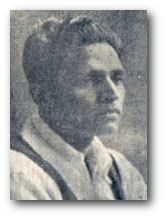 To the fertile, if restless, imagination of Mr. Kularatna, Ananda owes much. Nalanda was his special creation. Under his determined eye it grew within the course of a few years from a few ramshackle cadjan sheds into a massive and imposing structure. At first a mere extension of Ananda, it soon outgrew the stage of tutelage; and with that unerring instinct for the future so characteristic of him, he decided to make of it all independent institution. Subsequent events have shown how eminently sensible he has been. But what was to be the relation between the mother and child, particularly in the field of sport? Here again Mr. Kularatna’s scheming brain worked; he saw in Nalanda the future rival to Ananda in every sphere, not the least in the sphere of sport. He himself did much to foster this healthy rivalry, which is the life-blood of steady progress.
To the fertile, if restless, imagination of Mr. Kularatna, Ananda owes much. Nalanda was his special creation. Under his determined eye it grew within the course of a few years from a few ramshackle cadjan sheds into a massive and imposing structure. At first a mere extension of Ananda, it soon outgrew the stage of tutelage; and with that unerring instinct for the future so characteristic of him, he decided to make of it all independent institution. Subsequent events have shown how eminently sensible he has been. But what was to be the relation between the mother and child, particularly in the field of sport? Here again Mr. Kularatna’s scheming brain worked; he saw in Nalanda the future rival to Ananda in every sphere, not the least in the sphere of sport. He himself did much to foster this healthy rivalry, which is the life-blood of steady progress.
Of the first Ananda-Nalanda match I have only the vaguest memories. The Ananda team was skippered Rajakaruna. The Nalanda team was headed by the talented “B. S.” The details of that match have completely vanished from me, and it is a thousand pities that the record has not been preserved. The deluge of the second day is still vivid in my mind. It commenced early and the ground soon became more meet for water polo than cricket, and the match was abandoned.
The Success of the second Ananda-Nalanda match in the following year at least partly compensated for the fiasco of the first. The irate gods seem to have relented, for the weather was beautiful and the setting was complete for an interesting match. If in a minor key, all the paraphernalia of a Royal-Thomian match were there, the gaily, if sometimes extravagantly decorated tents; the music and the refreshments; the funny placards and the struggling, shouting "rounds"; the cheering and the counter-cheering; and the booing and the bellowing. Amid all this din and excitement the interest in the Match did not flag for one moment. I cannot remember the scores, but Ananda batted first, and the Nalanda reply was not much above ours. It was a close contest and exciting. The incident is still fresh in my mind. The last rabbit was in, but fortunately for Nalauda, Somavveera Gunasekara was still holding his end up magnificently. I was in charge of the leather from the pavilion end and seven runs more to decide the issue. The excitement was intense, the chances being even. It was clear that if by any chance.
I could get the rabbit to cross over to face me the match would have been ours. The first three balls of my over Somaweera batted, then seeing a little cautious nervousness on his part I pitched my leather a little higher up, imparting sufficient spin to secure a catch either behind the stumps or at first slip if he played back again. I do not know whether he guessed my purpose, or whether he deliberately feigned cautiousness in order to tempt me to over-reach myself, because I did not discuss the matter with him afterwards, but he took his courage in _both hands. He jumped out and drove me beautifully past cover for four. it was all over with us, for I was completely discomfited, and my fifth delivery was a weak one, which he found no difficulty in dispatching to the ropes in a similar fashion. The match was over, and Nalanda had won; to its lasting credit, the offspring had worsened its sire.
lt is a pity that it did not strike either team to have a permanent record in the shape of a photograph.
| Souvenir 1934|
Tales of Told
P. M. Jayatileke, Captain of Nalanda 1928 continue.1925 - 1928.
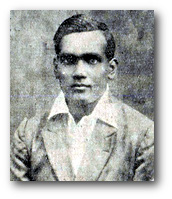
It was in March 1926 that Nalanda—herself with less experience and more ambition of brushing shoulders with the big Colleges-headed against Ananda, a young side with little and less experience but full of keen enthusiasm and late talent. There was keen preparation for it on both sides, as it marked the inauguration of anew social event. Some even happily prophesied that it would be all Occasion for merry making and frolic to which old boys of both Colleges and all Buddhists in general would look forward. The ground well decorated with flags and greenery that gave it the appearance of an annual fete, and every inch of available ground outside the boundary line had been made use of for the erection of tents. This match was, as is evident, one between equal sides. The Nalanda cricketers were almost all raw and inexperienced, while the Ananda team consisted of experienced and classy players of great prestige. It contained bowlers of all varieties, of all shades, and at least a single centurion. Against such a formidable side Nalanda, very poorly, losing the match by innings.
The match of 1927 was a whole day fixture, as the folly of having two days for it was emphatically proved the year before. Much of the previous year’s enthusiasm too had waned and the number of tents had dwindled to two one by each College, while the fun and merriment was but shadow of that of the previous year. This match however did not prove to be a disappointment. The Nalandian seemed to have profited by their year’s experience and are all round improvement in the team as a whole was shown. This time too Ananda found no difficulty in scoring. This time too their skipper top-scored by polished cricket. And this time too Nalanda failed to give Ananda a keen contest.
The match between the two schools in 1929 told a different tale. This time it was played on a Sunday on the pretext of enabling the Old Boys to attend it. On that day the traditions were reversed and Nalanda, though she had lost two of the "star" men who joined the enemy’s camp early in the term, proved her mettle by defeating Ananda. Nalanda batsmen struck great form and scored 144 runs. In their 1st innings Ananda was dismissed for the meager total of 94 runs as a result of some steady bowling and keen fielding by the Nalandians. Going in for the second innings Nalanda exceeded everybody’s expectations by making the proud total of 189 runs for six wickets. Their victory was crowned with a dashing and chanceless century (111 not out) by the Nalanda Captain, incidentally setting up two records, one for the highest individual score, and the other for the 1st century of the series. It was a great day for Nalanda and will remain so as long as this series lasts. The enthusiasm and the deafening cheers that characterized the occasion still linger in my ears. The balance was at last turned and the monotony of a string of Anandian victories was at last broken.
The wavering interest in this series owing to the general belief that it was all a one-sided affair was stemmed by this victory, and the dwindling enthusiasm was once again kindled.
| Souvenir 1934|
Principal Ananda Vidyalaya - 1934 Souvenir
P. D S. Kularatne Enq., B. A., B. Sc., L. L B (Lond.)
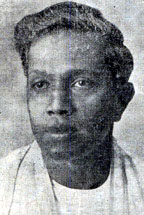 To the Buddhists of Ceylon there can be no school cricket match more interesting than the Ananda-Nalanda match. It has grown in importance every year and from what I have seen of the two teams, this year’s match will be one of the most exciting. My one regret is that distance may prevent me from being one of the spectators from the beginning to the end.
To the Buddhists of Ceylon there can be no school cricket match more interesting than the Ananda-Nalanda match. It has grown in importance every year and from what I have seen of the two teams, this year’s match will be one of the most exciting. My one regret is that distance may prevent me from being one of the spectators from the beginning to the end.
I am in rather a happy position as I shall be able to congratulate myself whichever side wins. I am interested in Ananda having been its principal for fifteen years. But Nalanda is our offspring, and no ordinary child too. She started life as a comely maiden and never had infancy. In other words, we gave her nearly five hundred and fifty of our best children and got her registered as a secondary School. She had and has her difficulties no doubt, and through the efforts of her Principal, those difficulties will gradually disappear.
Nalanda having had its remarkable birth throughout efforts must always be dear and near to us personally, whoever wins therefore I shall rejoice.
May there be healthy rivalry, clean sport, and may the better side win.
| Souvenir 1934 |
Principal Nalanda Vidyalaya - 1934 Souvenir
Dr G. P. Malalatsekera.
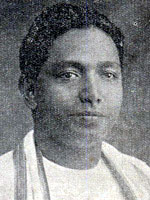 I consider it a great privilege that I should have been asked to write a few words to the Souvenir of the Ananda-Nalanda annual Cricket Match. I have a very vivid recollection of the inauguration of this event and the hopes which inspired those who were responsible for its inception. It was to be an opportunity where the two sister institutions could meet together in healthy rivalry, to measure their strength against each other in the playing field, but it was also to provide an opportunity for the common friends and supporters and past and present students of both schools to assemble in a spirit of festivity and gay jollity.
I consider it a great privilege that I should have been asked to write a few words to the Souvenir of the Ananda-Nalanda annual Cricket Match. I have a very vivid recollection of the inauguration of this event and the hopes which inspired those who were responsible for its inception. It was to be an opportunity where the two sister institutions could meet together in healthy rivalry, to measure their strength against each other in the playing field, but it was also to provide an opportunity for the common friends and supporters and past and present students of both schools to assemble in a spirit of festivity and gay jollity.
It gives me great delight to learn that these objects have been achieved and that nothing has happened so far to mar the spirit of good-will and fraternity that should form a special feature of such an occasion. May it be ever this! It was only the other day, that a very important personage of the University College told me, that he could always distinguish students of Buddhist Schools from those of others by their gentleness, and their consideration for others and by their civility. That statement sent a thrill through my heart, because it was spontaneous and I know, justified by facts. I am proud to have been connected even in a small way with the schools that have earned such deserved praise.
May they always prosper and in prospering, retain their noble ideals which have been so ably and so jealously guarded.
| Souvenir 1934 |
Meet the oldest living captain
Bobby Wickremasinghe
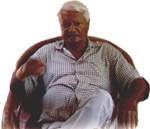 History should be revived by who lived it, and who still lives!" Who else can do such an act with precision? It is only individuals who has experienced the eventful era that can be accounted. In other terms, they are living proofs of a long saga. Thus, it couldn’t have been anyone else than the oldest living cricket captain of the Ananda College History, who could restore the aroma of the glorious 80 years of Cherished past. This is the story of a living testament.
History should be revived by who lived it, and who still lives!" Who else can do such an act with precision? It is only individuals who has experienced the eventful era that can be accounted. In other terms, they are living proofs of a long saga. Thus, it couldn’t have been anyone else than the oldest living cricket captain of the Ananda College History, who could restore the aroma of the glorious 80 years of Cherished past. This is the story of a living testament.
Don Ariyaratne Wickremasinghe, also known as Bobby by many, is the oldest living captain to speak about the old days of cricket in Ananda. He was born on 4th of November 1929. He says that the most important events happened in the Arms of Mother Ananda. He was at Ananda from Grade 6 onwards. "I may have joined Ananda with some particular ambition, although I was getting along with sports more than my studies." He said it with a smile on his face "Sports was my life back then..."He claims to be one of a kind sportsman at that period. "I was a cricketer, an athlete, a good table tennis player and also was the goal keeper of the soccer team!" He was very much known as a Hardy, aggressive Kid at school among the teachers as well as the students. "When I was at Grade 6, although I was small, I used to go for 1"XI practices and see what seniors do." He first started playing cricket for the school in 1945, under the captain D U Molligoda.
He claims to be an opening bowler and a batsman, dedicatedly learnt skills in the crucial areas in the game. He played along with personalities like Prof. Tissa Vitharana and Bonnie Wijesinghe. He captained the 1” Xl team in 1948 and had the opportunity of playing for the Combined School's Cricket Xl. "Back then the best eleven cricketers all over the island come together and plays against clubs like S.S.C." he said as it was a great prospect for him to display his colours in front of the nation. While he was playing for the Combined SchooI's Cricket Xl, he had the opportunity of being trained by the great Cricket maestro Learie Constantine, (Later known as Baron Constantine) who was world renown as the 'Black Bradman'. "He actually asked me to come to India, after seeing my capabilities saying he can improve me. But by then I was already occupied by other work, so my chance of playing better Cricket went lost."
Nevertheless, he completed his education, although he was indulged in cricket inseparably. He started off schooling at Nalanda initially, later transferred to Ananda due to lack of lab facilities. "My parents wanted me to become a doctor and I wanted to be nobody. But when he saw the direction l was heading to, he asked me whether I want to play Cricket or to study. That was the last question he ever asked from me about this matter..." He said it with a laugh "...had my parents pushed me I would have become someone else." He also explained the nature of the education scheme in that period. "We were like undergraduates. We wandered freely without any boundaries, because we were independent. It was a time I very much enjoyed. I remember the POG back then had a nickname called Gulliver, since he was a tall broad man." He said it with a laugh.
Due to his aggressiveness, he thought of becoming a law enforcement related professional. Thus, he joined the prisons department, where he received many experiences in that field of work. He became a very strenuous person in his profession, where he had served his duties in various places in the country. He stated; one of the things he regrets in his life is the misfortune of not playing cricket for Sri Lanka. Although, he has played and captained all divisions of cricket teams in his department just to keep the game alive within him. "I could have done been a great cricketer internationally, because everybody's not blessed with natural athletic abilities; and I was. It is a rare potential which comes to you from birth. But I'm happy to say that I played cricket even when I passed my 50's. Later when aging took over I started playing Tennis."
During his life, he had travelled around the world, visiting many countries, in which he has many memories he fondly reminded. "I and my wife crossed the North Pole, driving a car. For that, I received a certificate as well." He had visited many European countries. "Again with my wife I visited the Uppsala University in Sweden. lt‘s one of the oldest universities in the world." He said reminding his journeys. He crossed the Berlin wall in his venture and reminded of an incident. "There were regulations when passing the wall such as a specific time periods. But I didn't care much for that. So we stopped by the road going along the wall and had breakfast. Later there was an Air Career which came in search for us, because they were worried that we didn't turn up from the other side!" He also visited Japan, Malaysia, Russia and Austria for representation of the Prison Department of Sri Lanka as well as for personal travels.
Anyhow, he took the roles of being a Superintendant of Prisons, and then later he was the Deputy Commissioner of the Prisons Department. During his retirement in 1990, he was contracted to a task by Mr. Ranjan Wijerathne the former Defense Minister to handle thousand hardcore terrorists, as of his highly experienced background in his line of work. "They said I will be sent anywhere in the world of my choosing as an Ambassador. But as Ranjan Wijerathne was assassinated, I didn't feel up to that position."
Mr Wickremasinghe has two sons. Both were pupils of our beloved alma mater, Mother Ananda. "Younger son was a tennis champ in school. Now he's living in US. My elder son has interests in hunting. He has his own off-roader for that." He is also a grandfather. "Although my wife is no more, they cheer me up!" he said. It was evident because his youngest granddaughter was there while we had our chat, and she was very helpful to old Bobby. We only spent an afternoon with tea, together with Bobby Wickremasinghe. He spoke of life more than cricket, which finally meant worth speaking. During that short period of time, I and my colleagues were inspired by him. We were honoured to be with his presence at his residence in Malabe, where he shared a fragment of his life. These were the final words he shared with me.
| Interviewed by Muditha Mahindaratne & Photographs by Piyushan De Silva | Souvenir 2009 |

